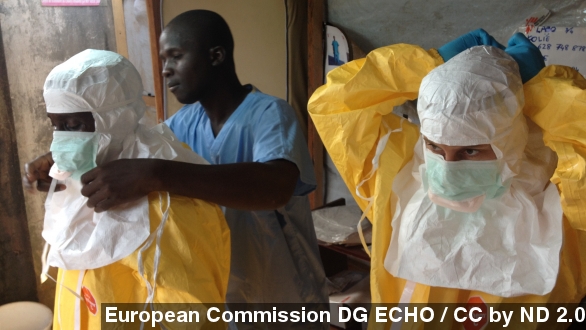The language organizations and governments are using to describe the ebola outbreak in Africa is getting a little flowery — so let's call it what it is: bad. The World Health Organization just used way too many words to dub it a global emergency.
The W.H.O technically called it an "extraordinary event" Friday in a lengthy release and press conference.
Twitter's character limit will help make things more clear: it's a public health emergency.
And countries have to work together to stop ebola from spreading.
Consider the wordy press release a metaphor: the international community has been criticized for being slow to respond.
The New York Times seems skeptical of the latest update, writing, "The [W.H.O's] declaration was apparently supposed to display a newly aggressive stance by the health organization." The outlet also points out the W.H.O made similar statements about polio in May, "But public health experts say the declaration on polio has not reversed or slowed its international spread."
It was just Thursday that the United States' Centers for Disease Control issued its highest-level alert — Level 1 — for the outbreak.
CNN: "What does that mean?"
"What that means is just more people and more resources dedicated to the response."
...What? It's the highest-level alert. The word is "alert," but the tone doesn't match the meaning. Here's the reality from a woman on the ground.
CCTV Africa: "A lot of people have died, including families. A medical nurse with the dead body of her mother, also died. The men who buried her also died on Monday."
Politico quotes CDC Director Tom Frieden, speaking to a House Foreign Affairs subcommittee Thursday, "'Inevitably,' someone will come to this country with the disease ... 'but we’re confident' that Americans are not at risk of a major outbreak."
There's that wavering again. The CDC is confident the U.S. isn't at risk of a major outbreak — but what exactly would constitute a major outbreak is unclear, though we're thinking any kind of outbreak would be major to the people affected.
Thursday the head of one relief organization called the U.S.' response a "failure."
This is the worst outbreak in Ebola's nearly 40-year history. It's spread because poor countries with poor health care systems are the ones fighting it. (Video via Bloomberg)
Now, with label upon label, alert upon alert, maybe the U.S. and other countries will step up their response — either in the form of money or more aid workers.
At the start of August, the W.H.O did announce a $100 million response plan to the outbreak. So far almost 2,000 people have been recorded as infected, and almost 1,000 have died.
This video includes images from Getty Images, European Commission DG ECHO / CC BY ND 2.0.


